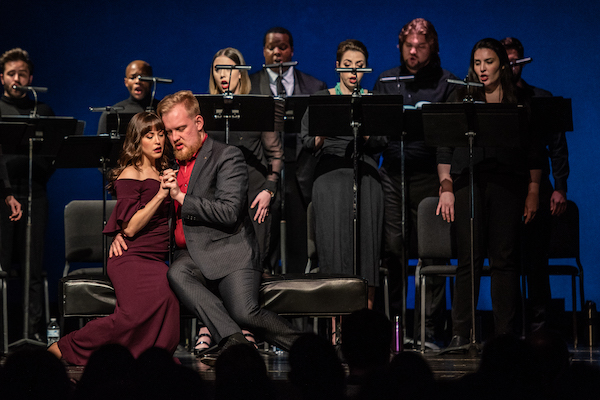Frank Martin rarity warms up a cold night at Wolf Trap

Shannon Jennings and Ian Koziara in Frank Martin’s “Le vin herbé” presented by Washington Concert Opera and Wolf Trap Opera Saturday night. Photo: Angelina Namkung
The legend of Tristan and Isolde has a rich literary history. Frank Martin went back to its origins in early French romances, compiled into a single narrative by scholar Joseph Bédier, for his oratorio Le vin herbé (The Magic Potion). Washington Concert Opera and Wolf Trap Opera collaborated to give a rare performance of the Swiss composer’s sometimes puzzling work, heard Saturday evening in the Barns at Wolf Trap.
The main elements of the story, narrated by the 12-person chorus, are familiar from Richard Wagner’s more famous opera. Martin includes more of the early part of the story, in which King Mark dispatches his nephew, Tristan, to retrieve Iseut la Blonde. The end of the work also uses the French version of the lovers’ final meeting, thwarted by the woman Tristan marries, Iseut aux Blanches Mains. When Iseut la Blonde’s ship arrives, she lies to Tristan, telling him the ship’s sail is black instead of white, the sign that Iseut has refused to come visit his deathbed.
Shannon Jennings made a poised, elegant Iseut la Blonde, her voice’s dramatic weight leaning toward a rich, tenebrous tone. Her powerful soprano will be featured again at Wolf Trap Opera this summer in more rare opera from the 20th century. Tenor Ian Koziara left everything he had vocally on the stage as Tristan, pouring as much force as he could into the strenuous parts of the role, with some ragged moments at the top of his range. The two voices intertwined beautifully in the avowal scene, like the metaphorical bramble briar that unites the lovers in death.
Soprano Summer Hassan, a Wolf Trap young artist in 2016 and 2017, turned the sharp-edged tone of her voice to bitter outrage as Branghien, the servant whose negligence guarding the eponymous love potion leads to the story’s tragic end. Renée Rapier’s powerful but somewhat unfocused mezzo-soprano gave a menacing edge to the role of Iseut’s mother, who entrusts the potion to Branghien.
Among the supporting cast, a surprise came in the puissant bass Anthony Robin Schneider, who stood out as one of the individual voices in the choral narration and later in the small role of Le Duc Hoël. A voice of stentorian power, he also returns to Wolf Trap this summer. Baritone Joshua Conyers and tenor Frederick Ballentine had pleasing turns as King Mark and Kaherdin, respectively.
While the voices all impressed generally on their own, there were fewer pleasing ensemble moments. The women’s voices blended most admirably, but in full passages with all twelve singers at top volume, the harmonies tended to be obscured in heavy vibrato. Martin created the work as a commission for a chamber choir of twelve singers, musicians used to working with each other regularly rather than a dozen soloists brought together for a performance. The score, with its high concentration of choral homophonic writing, needed more variety and refinement in this area.
WCO conductor Antony Walker led seven string players in the instrumental accompaniment, joined by pianist Bénédicte Jourdois from Wolf Trap. The paired strings and single double-bass were not always secure in intonation, especially in the violas, but Walker did an excellent job keeping a clean balance between his small band and the voices, both sharing the small stage. Walker’s bold gestures and sure sense of the beat held together a few perilous moments in the work’s third part, which seemed underrehearsed.
Although this was a concert performance, the singers taking principal roles left their spot in the chorus, acting out some scenes at the edge of the stage. This semi-staging, assisted with minor props and lighting, helped smooth over the work’s duller moments.
Le vin herbé will be repeated 3 p.m. Sunday. wolftrap.org; 703-255-1900



